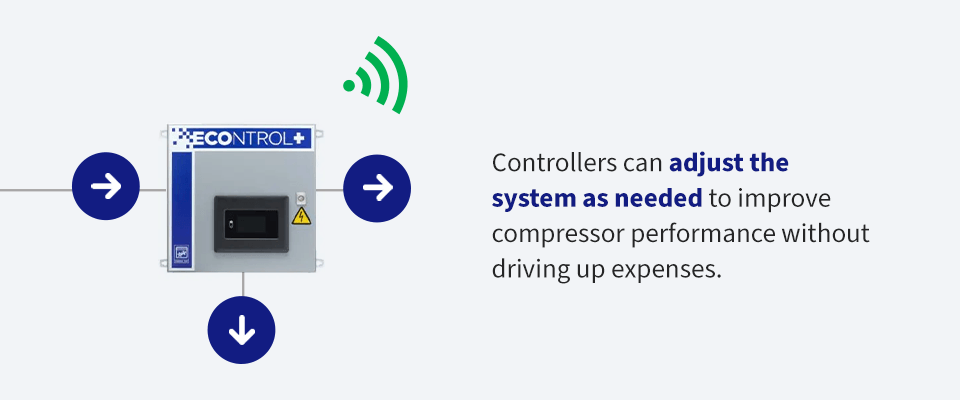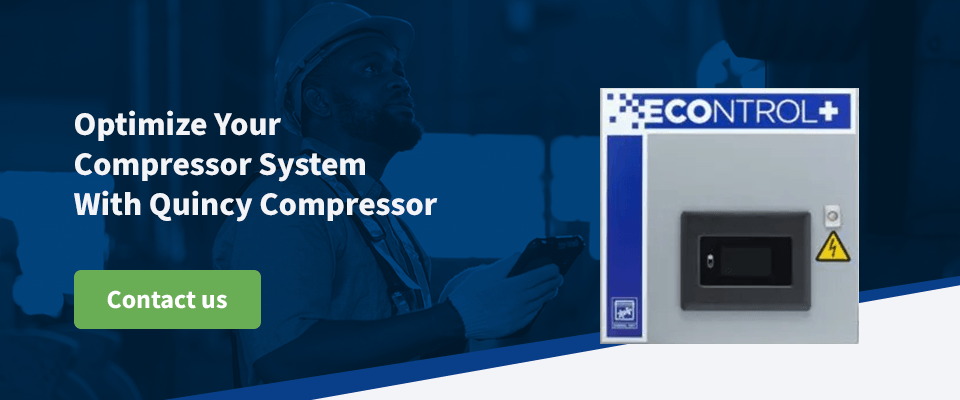Tu empresa depende de sus compresores de aire para mantener las operaciones eficientes. Aunque los compresores de aire están diseñados para funcionar sin problemas, pueden consumir energía de forma ineficiente. Una forma de optimizar su funcionamiento es un controlador de compresor de aire. Estos dispositivos regulan el flujo de aire y reducen el desperdicio de energía del sistema. Monitorizan la temperatura, la presión y los caudales, ajustándolos para asegurar que el sistema funcione de forma eficiente.
Los controladores de flujo de compresores son clave para compresores eficientes. Si buscas mejorar el rendimiento y limitar los costes energéticos, deberías considerar invertir en un controlador de compresores de aire. Explora nuestra explicación sobre los controles de compresores de aire para encontrar la solución adecuada para tu negocio.
9 Ventajas de tener un controlador en los sistemas de compresores de aire
Las empresas pueden integrar controles de compresores de aire en sus sistemas para mejorar sus operaciones. Con controladores que monitorizan el rendimiento del compresor, pueden ajustar el sistema según sea necesario para mejorar el rendimiento del compresor sin aumentar los gastos. Si quieres optimizar tu compresor de aire, deberías buscar un controlador de calidad.
1. Eficiencia energética mejorada
Uno de los principales beneficios de los controles de aire comprimido es su mejora de eficiencia. Los sistemas de aire comprimido son los principales consumidores de energía en el sector industrial. Los compresores de aire pierden el 80% de su energía de entrada en calor. Eso significa energía desperdiciada y mayores gastos solo para satisfacer tus demandas de producción.
Los controladores optimizan el funcionamiento del compresor ajustando el suministro de aire con la demanda. Este enfoque evita el uso innecesario de energía. Los controladores ajustan la salida según los patrones de uso, usando compresores cuando sea necesario. Con un enfoque de ajuste dinámico, tu instalación puede reducir el consumo y los costes de energía.
2. Reducción de costes
El ahorro energético no es el único ahorro que implica los controladores. También contribuyen a la reducción global de costes. Los controladores mantienen niveles óptimos de presión y reducen la carga sobre los compresores. Este ajuste reduce el desgaste del sistema, lo que minimiza los gastos de reparación y prolonga la vida útil del equipo. Además, menos problemas de desgaste se traducen en menos tiempos de inactividad no planificados. Combina estos ahorros con una mejor calidad y consistencia del producto, y tu negocio obtendrá mejores retornos.
3. Mejora de la fiabilidad del sistema
Tanto si trabajas en desarrollo farmacéutico como en cualquiera de los sectores manufactureros, la fiabilidad del sistema es una prioridad. Las fallas inesperadas en el equipo pueden interrumpir los calendarios de producción y afectar a la calidad de la producción. Los controladores de compresores mejoran la fiabilidad del sistema mediante la monitorización continua. Pueden detectar anomalías de presión y temperatura a tiempo. Ajustan el sistema o avisan a los empleados antes de que los problemas se agraven. Este enfoque proactivo significa que tu sistema recibe mantenimiento antes de tiempos de inactividad inesperados.
4. Gestión eficaz de la carga
Las instalaciones con múltiples compresores también enfrentan desafíos en la gestión de carga. Cada unidad debe funcionar sin solapamiento. Las innovaciones en compresores de aire incluyen la coordinación de varios compresores. Pueden equilibrar la carga para adaptarse a la demanda. En lugar de que los compresores funcionen innecesariamente o compitan, cada unidad funciona cuando es necesario. Los controladores avanzados gestionarán la secuenciación y el reparto de carga para mantener el sistema en la máxima eficiencia.
5. Monitorización remota
La nueva tecnología de compresores de aire también incluye monitorización y control remoto . Los operadores pueden observar y ajustar el rendimiento del compresor desde ubicaciones más convenientes. Esta característica es ideal para instalaciones con múltiples sedes. Simplemente controla tus compresores a distancia y ajustalos en cuanto surjan problemas. En lugar de quedarse atrapado en un solo lugar cuando los compresores necesitan atención, tu equipo puede abordarlos de inmediato y evitar inactividades.
6. Calidad de producto constante
Tus procesos necesitan una presión y calidad de aire consistentes. Si un compresor tiene dificultades para adaptarse a tus necesidades o no puede alertarte sobre contaminantes, podría afectar al producto final. Los controladores monitorizan el compresor y se aseguran de que mantenga niveles de presión estables. El resultado es una reducción de la variabilidad. Ya sea que utilices compresores para envases, dispositivos médicos o detalles de pintura, tu operación puede experimentar una mayor consistencia y calidad del producto.
7. Capacidades flexibles
Los controladores modernos se adaptarán a las demandas operativas. Pueden integrar compresores y sistemas adicionales en tu configuración actual. En lugar de enfrentarse al aumento de la demanda, tu negocio puede adaptarse fácilmente al crecimiento. Los controladores pueden sincronizar el funcionamiento del compresor con la distribución equilibrada de cargas. Esta escalabilidad es ideal para apoyar empresas o instalaciones en crecimiento con demanda fluctuante.
8. Integración conveniente de instalaciones
Si quieres mejorar la operación general de tus instalaciones, necesitas un controlador de compresor de aire. Pueden integrarse con tus sistemas de gestión de instalaciones, conectando a los operadores con el rendimiento de compresores de aire y otras compañías eléctricas. Enlazar tu equipo te da una mejor imagen de tu rendimiento global. Tus operadores pueden detectar las ineficiencias y prestarles atención sin necesidad de acotar la causa. Además, los controladores integrados facilitan la gestión de las instalaciones.
9. Mejor sostenibilidad del sistema
Las emisiones de gases de efecto invernadero son una preocupación para las empresas. La energía que alimenta tus compresores de aire genera emisiones como el dióxido de carbono, que contamina el aire. Los controladores de compresores pueden ayudar a tu operación a cumplir sus objetivos de emisiones. El uso optimizado de la energía reduce el desperdicio, lo que ayuda a disminuir las emisiones de carbono. Tu empresa puede mejorar su sostenibilidad medioambiental mientras reduce costes y optimiza la producción.
¿Tu compresor de aire y controlador satisfacen tus necesidades?
A medida que llegan nuevas funciones de compresores, es fácil que tu compresor o controlador quede obsoleto. Incluso si tu compresor de aire cumple con estándares como ISO 8573-1, puede que esté quedando atrás respecto a la competencia. Los controladores actualizados ofrecen características que mejoran la eficiencia y la fiabilidad. Si usas un mando anticuado, considera invertir en una mejora con estas características:
Transmisión de velocidad variable
Los compresores tradicionales funcionan a una velocidad fija: funcionan a plena capacidad sin importar la demanda. Este enfoque constante y a toda velocidad conduce al desperdicio de energía cuando la demanda de aire fluctúa. Los controladores con variador de velocidad variable (VSD) ajustan el sistema en tiempo real. Reducen el consumo de energía según lo que el sistema necesite. El resultado es una reducción del consumo y costes de energía. Los mandos VSD también evitan el ciclismo excesivo, lo que minimiza el desgaste.
Internet de las Cosas
El Internet de las Cosas (IoT) es una de las últimas innovaciones en aire comprimido. Los controladores conectados a IoT conectan tu sistema a Internet. Te permiten monitorizar tu equipo de forma remota. Con datos en tiempo real sobre el funcionamiento del sistema, puedes acceder a análisis de datos y alertas predictivas de mantenimiento. Los operadores pueden hacer un seguimiento del rendimiento del sistema y recibir alertas de problemas de la unidad antes de que provoquen inactividades. Los controladores IoT también permiten ajustes automáticos. El sistema ajustará automáticamente los niveles de presión para reducir la tensión del compresor.
Optimiza tu sistema de compresores con Quincy Compressor
Equilibrar productividad y eficiencia de costes es un reto para cualquier sector. Actualiza tu sistema de compresores con un controlador avanzado y disfruta de un ahorro significativo de costes y fiabilidad del compresor. Quincy Compressor ofrece a las empresas compresores de aire de alta calidad y nuestro innovador controlador ECONTROL+ para una gestión optimizada del sistema. ECONTROL+ te da control total sobre la sala de compresores . Tu instalación se beneficiará de un consumo energético reducido y un control remoto cómodo, todo ello sin comprometer el rendimiento.
Quincy Compressor está comprometida a ir más allá en atención al cliente, calidad de equipos y soporte al personal. Si buscas un socio que pueda ofrecer soluciones de compresores efectivas, estamos aquí para ayudarte. Ponte en contacto con nosotros para pedir tu presupuesto y ver cómo podemos mejorar tu operación.




